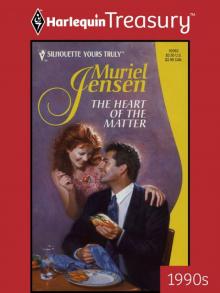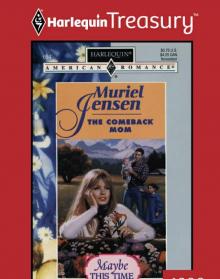- Home
- Muriel Jensen
Christmas In The Country
Christmas In The Country Read online
Table of Contents
Cover Page
Dear Reader
Title Page
Dedication
Chapter One
Chapter Two
Chapter Three
Chapter Four
Chapter Five
Chapter Six
Chapter Seven
Chapter Eight
Chapter Nine
Chapter Ten
Chapter Eleven
Chapter Twelve
Chapter Thirteen
Copyright
Dear Reader,
I love Christmas! My childhood memories are filled with images of holiday preparations in our apartment over a store in New Bedford, Massachusetts. I can see my father sitting in the middle of our pseudo-Oriental rug, a naked tree standing behind him in the bay window as he struggled with a string of lights. In those days, one faulty bulb prevented the entire string from working, and the only solution was to remove one bulb at a time and put a new one in its place. When the string still didn’t light, you moved on to the next bulb. The process could take an entire evening.
My father would blame my mother for the way she’d put the lights away, and she would blame him for handling them roughly.
Even at age seven or eight, I thought it amazing that the man who’d won the Bronze Star for leading a mission behind enemy lines somewhere in Italy the year I was born could be reduced to near-hysteria by a string of lights. And that the woman who’d taken in two of her sister’s children in the last year of World War II with no sure knowledge that her husband would be coming home, could threaten theatrically to run away if he didn’t stop shouting and just fix the lights.
It occurred to me that I lived with two heroes who had no real concept of their accomplishments.
My parents are both gone now, but their love is with me every moment—never more vivid and more uplifting than when I prepare for Christmas.
I wish each of you the memory of past love to light your present, and the prospect of new love to brighten your future.
P.O. Box 1168
Astoria, Oregon 97103
Christmas in The Country
Muriel Jensen
To my readers:
Happy Holidays to all of you!
Chapter One
“Liza, I don’t care if you have to hire Martha Stewart to hide in your oven and hand food out to you,” Edie Brickman shouted, “we’re doing this Christmas special, and that’s final!”
Liza turned away from the scene of hectic, midmorning Manhattan visible from her apartment window and decided to try reason on her panicked editor. Particularly since yelling and screaming had gotten her nowhere.
She went across the living room toward her, mustering the easy, friendly manner that had made her Wonder Woman Magazine country-living articles so successful.
“Edie,” she said gently, “think about it. I can’t cook, I can’t sew and my sister designs all those clever crafty things that I write about. You know this.” Liza hooked an arm in Edie’s and led her to a french blue sofa. “Do you think there will be any way I can hide that, with fifty-five minutes to fill on national television?”
Edie resisted Liza’s efforts to ease her onto the sofa. She dropped her purse on it, and her Versace coat and scarf, but her tall, coltish body remained standing, arms folded, feet slightly apart as though braced for battle.
“I got this job for you, Liza,” she said, shamelessly bringing up old debts. “I thought the plan was iffy, but you were desperate for work and insisted you could pull it off.” Edie waggled a finger at Liza. “I warned you that it was a recipe for trouble, but you said there was no reason it couldn’t work—you wax philosophical about the cozy country life in Connecticut from your apartment in Manhattan, and your sister, who actually does live in rural Connecticut, provides you with the occasional recipe and craft hint that you use as your own. Okay. It was Mr. Whittier’s idea that Wonder Woman have a country columnist, so I put you on thinking it’ll make the publisher happy but it’s a fad, the reader will tire of it in a year and we can move you into something else. But what do you do?”
Liza smiled flatly. “I become a sensation and quadruple your circulation. How thoughtless of me.”
Edie put a hand to Liza’s shoulder and pushed.
Liza fell onto the sofa and Edie sat beside her, dark eyes and severe bun making her look a decade older than her thirty-three years—and lethal. “Yes. That’s what you did. But with popularity and acclaim comes responsibility—to your readers, to the magazine, to Mr. Whittier whose name is on our paychecks, but most of all…” She paused significantly. “Most of all to me, who put my butt on the line to get you a job and help perpetrate this charade and who is going to make you very sorry if I find myself unemployed!”
Liza leaned back against the sofa cushions, wishing desperately that there was a solution. “Edie, I would do this if I thought there was any way I could pull it off. I mean, last year when Wonder Woman insisted I do that local cable show at Christmas, I got the studio set up, flew Sherrie in to help me and we made it happen, but you’re talking about bringing the reader into my Connecticut home.”
Edie leaned back beside her, suddenly calm. “That’s right.”
They stared at the opposite wall with its family photos. “Edie,” Liza reminded her, “I don’t have a Connecticut home. This is where I live. Manhattan. And Sherrie can’t help, either. She lives in Connecticut, but in a little duplex that not even studio lighting would make quaint.”
“Then you’ll just have to find a solution, won’t you?” Edie’s voice was quiet now and a little high, as though she were talking to a small child.
Liza knew what was happening. This was a sort of stabilizing technique Edie used when things got too stressful. She mentally removed herself to a peaceful distance and forced a quiet tone of voice.
Piqued because she had no such technique, Liza took pleasure in undermining Edie’s.
“You said the producer also’ wants to feature my husband.”
“That’s right.”
“And my children.”
“Yes.”
“Edie, perhaps it’s slipped your mind, but I don’t have either—any.”
Edie smiled, apparently still in her happy place. “Well, you’ve got about four days to acquire them.”
“You know, I was thinking.” Liza sat up and turned sideways, leaning an elbow on the back of the sofa as she focused on Edie. “There’s another option we’re not considering.”
Edie rolled her head toward her on the cushion. “What’s that?”
“Honesty,” Liza replied.
Edie stared at her a moment, then laughed scornfully. “In publishing?” she asked. “Don’t be ridiculous.”
Liza sat up, warming to the idea. “I’m serious, Edie. When I took this job eighteen months ago I was desperate for work.”
“And trying to help Sherrie, whose husband had just left her with two little children and another one on the way. I remember. What does that have to do with now?”
“Now I have a savings account, a little bit of fame. If I lose this job, I can get another one. And I’ll even tell Mr. Whittier that I deceived you, that you never had any idea what I was doing.”
Edie sat up, every muscle taut. Liza recognized her expression as the twenty-minutes-to-deadline, messwith-me-under-pain-of-death look. “First of all, you’ll get another job doing what? The fame you’ve acquired has been as a cozy-living, good-cooking, home-decorating, husband-loving, child-rearing columnist—the very image you’re talking about destroying. Believe me, the single-woman-in-Manhattan bit just doesn’t sell copy.” Edie drew a breath. “Secondly, I know you send a percentage of your income to he
lp Sherrie get by. What’s she going to do without it? I know she’s a chef in a little gourmet restaurant in Rockbury, but she has three children to support. And thirdly…” Edie frowned darkly, her happy place well and truly dissolved. “Mr. Whittier will never believe I didn’t know what you were doing. I have my job because nothing gets by me. You go down, girlfriend, and I go down.” She made a chopping motion with her hand. “In case it’s not clear, we are dismissing honesty as an option.”
Liza groaned and closed her eyes. The wages of sin. Her mother had always warned her about the importance of understanding the relationship between cause and effect.
When she’d been seven and ridden on the back of nine-year-old Sherrie’s toboggan, trusting blindly that her sister had checked for obstacles in their path, her mother had given them her famous speech as she tied the slings that supported their broken left arms.
“You have to look first,” she’d insisted with the weary patience Liza remembered so well. Alice De Lane had been a widow who worked hard to support her daughters, and spent all her free time with them. “Before you go off on your adventures. I know you’re both very brave, but you have to apply a little common sense to your lives or you won’t live long enough to enjoy the fruits of your courage.”
That hadn’t made much sense then, but it did now. Sherrie had married charming, sexy Tom Blake after a six-week acquaintance—deeply, madly in love. But in the ten years they were married, he never held a job longer than three months, and finally left Sherrie for the bookkeeper in a car dealership, his last place of employment. They’d left Connecticut for a motorcycle trip across the country.
Liza had done a little job-hopping herself, though with far less frequency. She’d worked for a newspaper, an ad agency, a local television station, and as a publicity director for a design firm.
Each job had been interesting in its way, but she hadn’t been able to find the stimulation and excitement she’d been so sure was out there—somewhere. And then she’d answered the ad for a country columnist for Wonder Woman, and the rest was history.
She’d parlayed her own dreams of the ideal life into a picture 3.7 million women believed in and wanted to emulate. And she’d found her excitement and stimulation in their response.
But now she had to deal with the fact that what she’d given them had been only her dreams and not her reality. It had all appeared so logical when she’d needed work. She and Sherrie had spent so much of their early lives helping each other that the pairing of their talents for a common purpose had seemed so natural.
It was the successful outcome of their efforts that had become the problem. Readers loved Liza’s columns about life in the country and wanted to hear more about her family, to share more of her recipes and her hints for beautifying her home with natural things.
They’d demanded a book, then a local cable special, and now they wanted her to go national, completely unaware that she was a fraud.
There had to be an answer, but all she could come up with was passage on a freighter to Cameroon.
The telephone rang and Liza stood listlessly, stepping over Edie’s legs and going to the desk by the window. Edie’s threats of retribution had apparently been toothless because she now lay sunken in the sofa, her Kate Moss legs stretched out before her, her arms flung out in an attitude of despair, probably contemplating life in the unemployment line.
Liza picked up the phone. “Hello,” she said.
“Miss De Lane.” It was Henry in the lobby. “There’s a Mr. Whittier to see you. Do you wish to see him?”
“Ah…who, Henry?”
Liza had heard him, but she didn’t believe him. So therefore she must have misunderstood.
“Whittier,” Henry said again. “Benjamin Whittier. He says he’s your publisher.”
God! She hadn’t misunderstood! She put a hand over the receiver and turned to Edie. “Mr. Whittier is here!”
“Where?” Edie came out of her thoughts, looking around, long body drawing in as though preparing to hide.
“In the lobby!” Liza whispered. “He wants to see me! But how does he know I’m here? Everything goes to that post office box in Connecticut.”
Edie came to the phone, looking frantic. “Well… he called and asked me how to reach you,” she said softly, “and I gave him this phone number, telling him you kept an apartment here and that you’d come to New York to do some shopping. But I thought he was going to call you.”
“Miss De Lane?” Henry asked worriedly.
“Send him up, Henry,” Liza replied, then hung up the phone. She squared her shoulders and took Edie by hers. “Edie, I know I owe you big, but I think I’d do your career more harm than good if I tried to do this show and blew it. So I’m going to tell Mr. Whittier the truth, and I promise you I’ll make sure you’re in the clear.”
Edie sank under her grip. “Sure. Sure. Whatever. When it’s all over we’ll get an apartment together somewhere in the city where cab drivers won’t even go. We’ll get fishnet stockings and neon-colored underwear and maybe a pimp.”
Liza shook her. “Pull yourself together. Your father’s a millionaire. I don’t think you’ll have to turn to prostitution.”
“I’m going to the bathroom.”
“No, you’re not.” Liza caught Edie’s arm as she tried to retreat. “You’re going to stay with me and pretend great surprise when I spill my guts, so that I can convince him you had nothing to do with this.”
Edie pulled against her. “No. I can’t lie—that’s why I don’t edit fiction. I’ll try to say the words and my face’ll get red and I’ll start to stammer and he’ll know! He’ll know!”
“Edie!” Liza held on. “Listen to me. You edit me, don’t you?”
“Yes.”
“And it’s all a lie, isn’t it?”
Edie’s face crumpled.
“Okay, forget I said that. Just sit on the sofa and try to remember all those new circulation figures you were spouting at me earlier. He’ll like that.”
The doorbell rang. Edie went to the sofa, a tissue pressed to her nose, and Liza went to the door, trying to decide how best to approach her employer with the news that his nationally popular country columnist couldn’t boil water.
Well, she could if she had a microwave.
She pulled the door open, a cheerful greeting on her lips, but Ben Whittier didn’t even hear it.
He pushed past her into the apartment, his wide, white-bearded face wreathed in smiles as he waved something in his hand.
“Edie! How fortunate that you’re here, too! Wait’ll you see what I’ve got.” He looked around the living room, shedding his cashmere coat and tossing it at a chair. Then he grinned at Liza. “I know you have all those farmy things to do in the country, but when you’re in New York don’t you watch television? Where is it?”
Liza was confused by the question, but went to the cabinet across the room and opened its double doors, revealing a television, VCR and stereo.
“Ah!” He handed her the videotape he held. “Pop that in. You won’t believe this!” He sat beside Edie, waited for Liza to do as he instructed, then waved her over to sit on his other side.
Then he noticed that Edie was crying. “What’s the matter?” he asked, only partially distracted.
Edie waved the tissue and said something incoherent.
“It’s…the holidays,” Liza said, figuring there would be plenty of time to elaborate once their boss had made his point, whatever it was.
“Well, hold on to that tissue.” He picked up the remote control off the coffee table and aimed it at the television. “You’re going to need it.”
There was a few seconds of a group of women singing “Louie, Louie.” Liza recognized one of the women as Whittier’s wife. He fast-forwarded. “Sorry. My wife’s sorority’s talent show.” Then he stopped at what appeared to be a news interview and rewound.
“…daring escape involved six days of running and hiding from Baalbek to Damascus, pursued by the Fa
twa Jihad, a radical band of terrorists. Father Etienne Chabot taught French at the International School and was taken hostage in July. Jeffrey James, kidnapped in early October, came to Beirut as a consultant on a freeway project.”
The camera closed in on the lined face of a small old man on a hospital gurney. He smiled weakly. “Bonjour,” he said, then added in heavily accented English, “Hello. Hello, Amerrrica.”
“Hello, Father Chabot,” the reporter said, leaning over the gurney. “How would you describe your escape from the Fatwa Jihad?” He put the mike to the priest’s mouth.
“Eet was…l’enfer,” he said, then, smiling, translated. “Hell. Eet was hell. If it was not for mon ami, I would be with le bon Dieu.”
There was a murmur of sound as a doctor and a nurse began to push the gurney away.
“Father Chabot,” the reporter said to his audience, “suffered two broken ribs and a gunshot wound to the leg in the escape. And he credits American engineer Jeffrey James with carrying him out of the line of fire and keeping him alive for six days while they evaded their pursuers and made their way over the border into Syria. Reporter Mitch Goldrick is in the American embassy in Damascus with Mr. James. Mitch?”
The scene switched to a comfortable, book-lined room and a scruffy, bearded man in a high-backed chair. The camera closed in on his face and Liza immediately rethought her impression of him as scruffy.
Thick dark brown hair was wildly unkempt and cottony looking, as though it hadn’t been cared for in weeks. Lines of weariness etched his face.
But the man’s eyes were remarkable. They were a vivid medium blue like the color of lobelia in a summer garden. And Liza thought the calm intelligence in them was truly extraordinary considering what he’d just been through. She wouldn’t have been surprised to see in them anger for the past two months, annoyance with the reporter for intruding upon his first few hours of true freedom, thoughts of revenge, a burst of well-deserved pride in what he’d accomplished.

 Christmas In The Country
Christmas In The Country Blown Away
Blown Away In My Dreams
In My Dreams The Heart of the Matter
The Heart of the Matter New Year's Wedding
New Year's Wedding Always Florence
Always Florence The Comeback Mom
The Comeback Mom To Love and Protect
To Love and Protect Jackpot Baby
Jackpot Baby The Man She Married
The Man She Married Love Me Forever
Love Me Forever